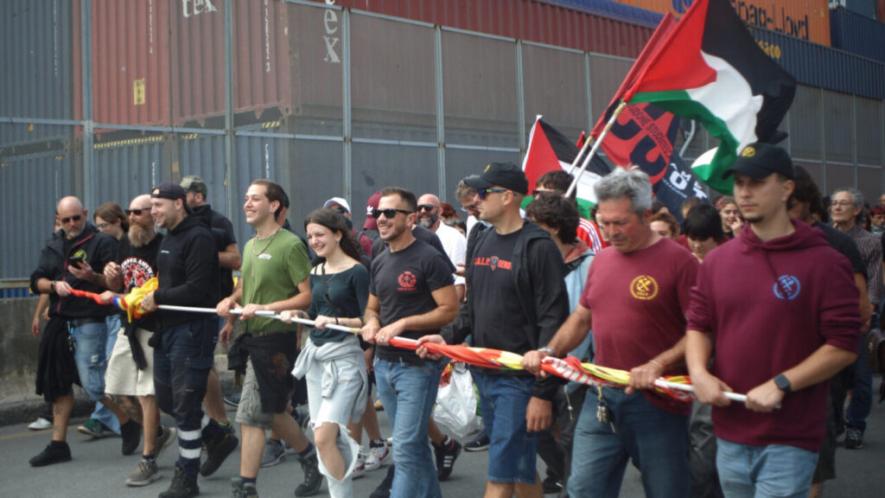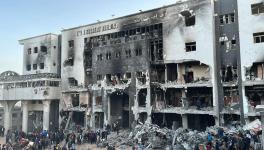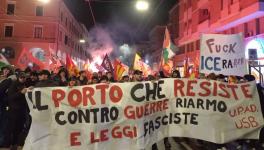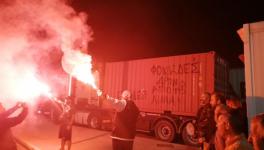Italian City Says No to Warships, Weapons for Israel

Genoa's dockworkers during Palestine solidarity action. Source: USB/Facebook
From early morning on Friday, July 25, Genoa set the stage for new anti-armament mobilizations in Italy: dockworkers protested arms transfers to Israel, while the public rejected plans that would turn their city into a hotpoint of NATO’s war machine.
José Nivoi from the Autonomous Collective of Port Workers (Collettivo Autonomo dei Lavoratori Portuali, CALP) and the local union chapter of Unione Sindacale di Base (USB), emphasized that the morning rally was directed specifically at the new city authorities, with dockworkers demanding a clear stance of solidarity with Palestine – an assurance they say was given. “The evening assembly was also very lively,” Nivoi told Peoples Dispatch. “Around 150 people took part – mostly members of the general public, not just activists – and joined a discussion on the plans to transform the port into dual-use military infrastructure.”
Dockworkers against arms transfers
Port workers in Genoa have long taken action against arms transfers through their harbor, including past warnings about shipments to Saudi Arabia. Since the beginning of Israel’s genocide in Gaza, they have deepened ties with other dockworkers’ collectives, particularly in Greece and France, acting along similar lines. According to Nivoi, it was a warning from their Greek comrades that alerted them to the planned arrival of the COSCO Shipping Pisces – a vessel carrying military-grade steel bound for Israel, which had previously been blocked by port workers in Piraeus – at the Ligurian ports of La Spezia and Genoa.
Although it is still unclear whether the COSCO Pisces will eventually dock in Genoa in the coming days, port workers have made their position clear: if asked to handle its military cargo, they will refuse. USB has stated that such a request would trigger an immediate strike. “Our port must be declared off-limits to ships bound for or arriving from Israel,” USB’s chapter in Genoa’s port stated. “We join this struggle for peace, civilization, and against genocide in Palestine, as well as in all other theaters of war.”
There is a clear moral and ethical imperative to boycott the handling of military cargo, Nivoi explains, as doing so makes workers complicit in wars and war crimes. Beyond that, he adds, there are serious health, safety, and legal concerns that both employers and the government routinely overlook. In principle, Italy has strong legal safeguards against arms transfers to countries engaged in armed conflict, including constitutional provisions that explicitly repudiate war. In practice, these are often disregarded. Other crucial questions remain unaddressed, including the risk military cargo poses to both workers and surrounding communities. “These containers are sometimes full of explosive materials. What happens if something goes off? It’s not just the workers who will suffer the consequences, it’s the entire city,” Nivoi says. “The same goes for chemical cargo. How do we know what the health effects will be for workers handling chemicals used in weapon production?”
Dual-use puts everyone at risk
The dockworkers’ position aligns with a broader campaign recently launched by USB in support of conscientious objection to arms transfers and scientific collaboration with Israel. It also serves as a bridge between the Palestine solidarity efforts led by Genoa’s port workers and the wider mobilizations against militarization taking place across Italy and Europe.
According to plans recently floated by Italian regional and national authorities, Genoa could be expected to host an increasing number of non-cargo ships in the future. A dual-use clause is supposed to allow EU member states to designate civilian infrastructure for military purposes under newly expanded NATO budgets. At a summit in June 2025, with no significant opposition from major European governments, members agreed – bowing to pressure from US President Donald Trump – to allocate 5% of GDP to the war alliance. Of this, 3.5% is earmarked for military troops and equipment (presumably mostly US-made), while the remaining 1.5% can fund more loosely-related infrastructure.
Plans are already underway to classify ports, railways, and highways as dual-use infrastructure, making them eligible for funding under the 1.5% of NATO-linked spending. Genoa’s port, which lies along several strategic transport corridors, has been included on one of these lists. Its new breakwater project has been described by officials as suitable for handling smaller aircraft carriers, NATO vessels, military equipment, and troops. This only compounds the existing risks associated with the dam project, Nivoi warns, from its construction on a collapse-prone foundation to environmental threats and steep financial costs.
“But perhaps the most serious danger,” he adds, “is what the decision to make the breakwater dual-use really signals: how far European leaders are willing to go in preparing for war. It’s a major shift. They are ready to dedicate everything to it, so much so that the risk of war becomes more real with each passing day.”
However, a growing number of people in Genoa reject these plans, refusing to be turned into accessories to war. Echoing this sentiment, the anti-armament platform “Disarmiamoli!” called for a public assembly on Friday to denounce the militarization of local infrastructure. “In a national context of rearmament, increased military spending, and escalating war, this decision dramatically increases risks for residents, not just workers,” the network said in a press release.
Strengthening infrastructure doesn’t mean militarizing it
Marta Collot, spokesperson for the left party Potere al Popolo, echoed the platform’s call for action. “We know that words are not enough and that concrete resistance is needed in a context of rising military spending pushed by NATO, of a European rearmament and so-called common defense that only brings more war, and of a war economy that will strangle our country from within,” she wrote after the protest on Friday.
Activists and workers argue that instead of transforming civilian infrastructure into military hubs under the pretext of dual-use, the government should invest in public services and social security. While some claim that embracing dual-use policies could expand funding for projects that will otherwise remain underfunded, dockworkers firmly refute such reasoning. “Strengthening port and logistics infrastructure must not mean putting them at the service of war, but rather at the service of trade relations built on conciliation and international cooperation,” USB members at the Port of Trieste stated in a message ahead of the Genoa mobilizations.
“While we’re being asked to handle arms shipments that boost the profits of private companies and accept rising military budgets, our own salaries and livelihoods are stagnating or collapsing,” Nivoi says. Due to inflation and cuts to public services, he adds, Italy’s working class is increasingly forced to choose between accessing education, healthcare and affording basic necessities. “Workers in Italy are already feeling the effects of this new war obsession through inflation and growing poverty.”
Courtesy: Peoples Dispatch
Get the latest reports & analysis with people's perspective on Protests, movements & deep analytical videos, discussions of the current affairs in your Telegram app. Subscribe to NewsClick's Telegram channel & get Real-Time updates on stories, as they get published on our website.
























